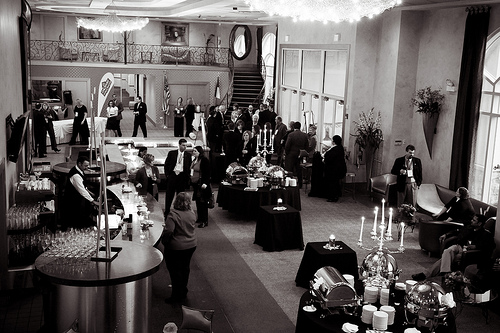 Business networking plays a large part in modern commerce. It’s a highly competitive world, and it can be difficult to get your business noticed. Hosting a networking event is a good way to raise the public profile of your business, and to introduce your goods and services to a wider range of potential clients. The key to any successful social gathering is planning, and business owners who will be hosting an organized networking opportunity need to begin early and lay their plans accordingly. The following tips will give business owners and office managers the information they need to plan a successful networking event.
Business networking plays a large part in modern commerce. It’s a highly competitive world, and it can be difficult to get your business noticed. Hosting a networking event is a good way to raise the public profile of your business, and to introduce your goods and services to a wider range of potential clients. The key to any successful social gathering is planning, and business owners who will be hosting an organized networking opportunity need to begin early and lay their plans accordingly. The following tips will give business owners and office managers the information they need to plan a successful networking event.
Realizing the Purpose of Your Event
The first step in planning any networking event is to define its purpose. Perhaps you are a new company looking to introduce yourself and your services to the local community. Or you may be an established company introducing a new line of products to other industry professionals. Defining the overall purpose of your event will help you decide who to invite, when to schedule the event and where to hold it. For example, if your purpose is to introduce new products to other industry professionals you would be more likely to schedule the event during the day, when business owners and marketing heads are on the clock. If you are introducing your business to the local community, you would want to schedule the gathering for the early evening so your timing doesn’t clash with the local businesses hours of operation.
The purpose of your event will also influence the number of guests you invite. A networking event aimed at industry insiders will likely have a shorter guest list than one designed to introduce your company to the community at large. The size of the guest list will directly impact on the next big decision, where to hold your event.
Choosing A Venue
Choosing the right venue for your networking event is one of the most important decisions you will need to make. Once you have found a suitable venue, everything else is operational detail.
Your first impulse may be to hold the event at your place of business. It seems reasonable, but offices and shop-fronts aren’t really designed to host a large gathering of people. For a professional event you need a professional event space, and that means a hired venue or banquet hall. Atmosphere is key, and professional event venues are able to offer a greater flexibility when it comes to hosting a social gathering. Again, the size of your guest list will dictate the type of room you need. Look for hired venues that can offer a choice of halls, suitable for any occasion. The venue’s staff should be able to make recommendations based on the size of your party, and the activities you have planned for your event. Make the purpose of your networking event clear, and consult with the on-site event planner for advice on how to maximize the success of your gathering.
Refreshments
No social gathering can truly be a success without refreshments. As the host you want your guests to feel well looked after, so you will want to provide some light refreshment. For a business networking event, where the emphasis is on mingling and conversation, you might want to consider a light buffet or a series of easy to handle appetizers. Remember, this is not a sit down dinner so the food you offer should be easy for your guests to enjoy while mingling and engaging in conversations.
Many hired venues have on-site catering staff that can be contracted to provide a full range of menu options. In many cases these on-site caterers can be secured as part of the venue booking, which can save you money in the long run. Discuss your refreshment needs with the venue’s event planner when making your initial inquiries.
Final Details
With the venue booked and the catering in place, all that is left is to finalize the details of your networking event. You will want to designate a greeter at the the door, who can welcome guests and give them information packs on your business or service. You should also have a sign in sheet, or someone designated to collect business cards. Hopefully your event will lead to some long term contacts, and you will need retain your guest’s contact information. Consider providing name tags, to make it easier for your guests to identify each other.
With your event underway, now is the time to put your best foot forward and begin mingling with your guests. A networking event is a powerful tool for businesses who wish to introduce themselves, and their services, to local communities and other industry professionals. With a little forward thinking, you can make your next networking event a smashing success.





